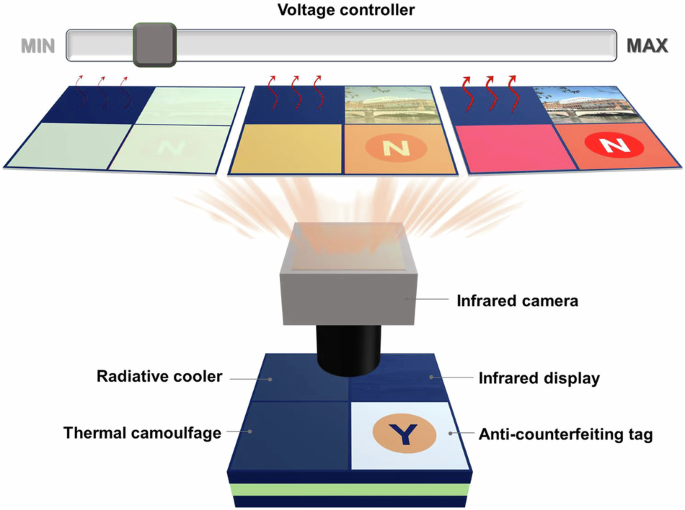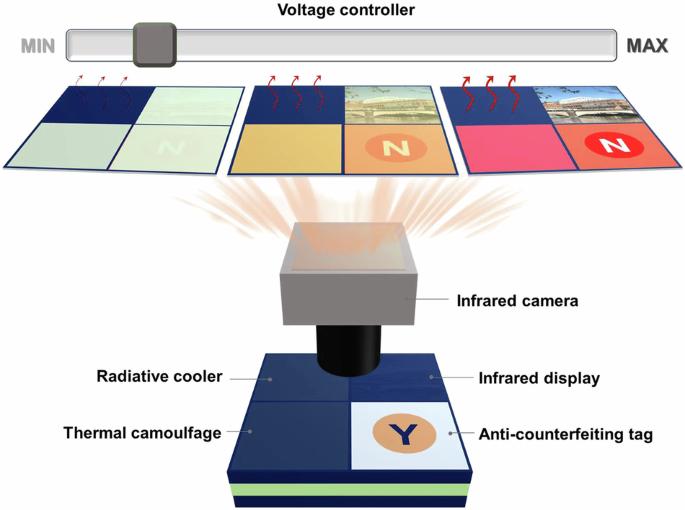Electrically tunable infrared optics enabled by flexible ion-permeable conducting polymer-cellulose paper
IF 12.3
1区 材料科学
Q1 ENGINEERING, ELECTRICAL & ELECTRONIC
引用次数: 0
Abstract
Materials that provide dynamically tunable infrared (IR) response are important for many applications, including active camouflage and thermal management. However, current IR-tunable systems often exhibit limitations in mechanical properties or practicality of their tuning modalities, or require complex and costly fabrication methods. An additional challenge relates to providing compatibility between different spectral channels, such as allowing an object to be reversibly concealed in the IR without making it appear in the visible range. Here, we demonstrate that conducting polymer-cellulose papers, fabricated through a simple and cheap approach, can overcome such challenges. The papers exhibit IR properties that can be electrochemically tuned with large modulation (absolute emissivity modulation of 0.4) while maintaining largely constant response in the visible range. Owing to high ionic and electrical conductivity, the tuning of the top surface can be performed electrochemically from the other side of the paper even at tens of micrometer thicknesses, removing the need for overlaying electrode and electrolyte in the optical beam path. These features enabled a series of electrically tunable IR devices, where we focus on demonstrating dynamic radiative coolers, thermal camouflage, anti-counterfeiting tags, and grayscale IR displays. The conducting polymer-cellulose papers are sustainable, cheap, flexible and mechanically robust, providing a versatile materials platform for active and adaptive IR optoelectronic devices.


通过柔性离子渗透导电聚合物-纤维素纸实现电可调红外光学
可提供动态可调红外(IR)响应的材料对许多应用都非常重要,包括主动伪装和热管理。然而,目前的红外可调谐系统通常在机械性能或调谐模式的实用性方面存在局限性,或者需要复杂而昂贵的制造方法。另外一个挑战是如何实现不同光谱通道之间的兼容性,例如既能在红外范围内可逆地隐藏物体,又不会使其出现在可见光范围内。在这里,我们证明了通过简单而廉价的方法制造的导电聚合物-纤维素纸可以克服这些挑战。这种纸显示出的红外特性可通过电化学方法进行大调制(绝对发射率调制为 0.4),同时在可见光范围内保持基本恒定的响应。由于具有较高的离子和电导率,即使在纸张厚度为几十微米的情况下,也可以从纸张的另一面对顶面进行电化学调谐,从而无需在光束路径上覆盖电极和电解液。利用这些特点,我们研制出了一系列电可调红外设备,重点展示了动态辐射冷却器、热伪装、防伪标签和灰度红外显示屏。导电聚合物-纤维素纸具有可持续、廉价、柔韧和机械坚固的特点,为有源和自适应红外光电设备提供了一个多功能材料平台。
本文章由计算机程序翻译,如有差异,请以英文原文为准。
求助全文
约1分钟内获得全文
求助全文
来源期刊

npj Flexible Electronics
Multiple-
CiteScore
17.10
自引率
4.80%
发文量
91
审稿时长
6 weeks
期刊介绍:
npj Flexible Electronics is an online-only and open access journal, which publishes high-quality papers related to flexible electronic systems, including plastic electronics and emerging materials, new device design and fabrication technologies, and applications.
 求助内容:
求助内容: 应助结果提醒方式:
应助结果提醒方式:


